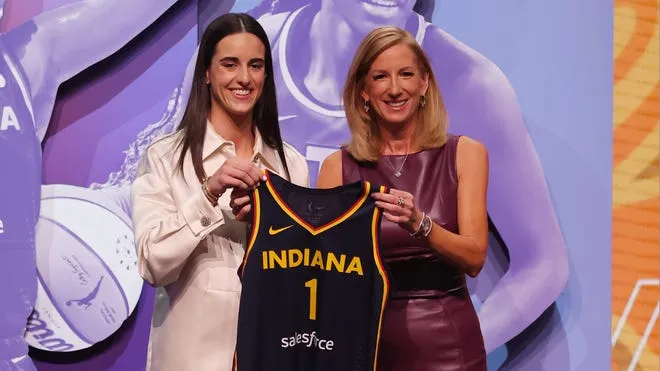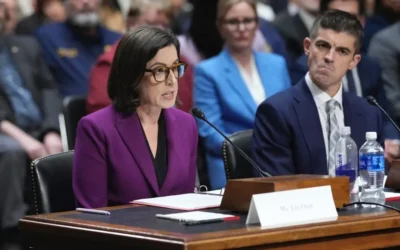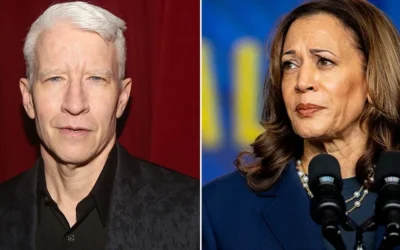Introduction
Caitlin Clark has emerged as one of the most exhilarating talents in women’s college basketball, transcending the sport with her impressive skills and competitive spirit. However, her rivalry with Angel Reese, a notable figure in the WNBA, and the excitement surrounding her team, the Indiana Fever, adds layers to her story that go beyond the court. With all eyes on Clark and her recent achievements, including a decisive win over Reese’s team and a historic moment for ESPN’s WNBA viewership, a broader conversation around sportsmanship and inclusivity in basketball is gaining momentum.
Caitlin Clark’s Rise to Stardom
Caitlin Clark’s reputation burgeoned during her time at the University of Iowa, where she showcased her remarkable talent, earning accolades that solidified her position as a premier player in women’s basketball. Known for her deep shooting range and playmaking abilities, Clark has drawn comparisons to some of the greatest in the game. Her dedication and performance earned her not just personal accolades but also the respect of her peers and fans alike.
After concluding her college career, Clark was drafted by the Indiana Fever, where her professional journey began. For the Fever, her arrival marked a turning point as they aimed to revitalize their efforts in the league. The attention she garners on and off the court is not only a testament to her skills but also signifies a growing interest in women’s basketball—both in terms of viewership and financial investment.
The Rivalry with Angel Reese
One of the most prominent storylines surrounding Clark is her rivalry with Angel Reese, a player known for her tenacity and skill. Their competitive history has been highlighted in various matchups, creating a narrative that captivates basketball fans. Even during their high school career, intense competition fueled the development of both players, establishing a tension that remains palpable to this day. Their rivalry reflects not only individual prowess but also the evolution of women’s basketball, where stories of competition and excellence are becoming more prominent.
Some spectators have noted that the rivalry goes beyond mere competitive spirit, touching on deeper themes of sportsmanship, representation, and the role of women in sports. While Clark is often seen as a star on the rise, Reese’s style and attitude have earned her a fierce following, leading to an intriguing dynamic that captivates audiences. The attention from media coverage and fan discussions magnifies their rivalry and invites a more profound understanding of competition among female athletes.
Historic ESPN WNBA Viewership
Recently, a match featuring the Indiana Fever and the Chicago Sky broke records on ESPN, setting a new benchmark for WNBA viewership. This significant milestone reflects the growing popularity of the league and the rising stars within it, including players like Clark and Reese. As viewership numbers continue to soar, the WNBA is already witnessing record-breaking attendances, fulfilling long-awaited expectations for women’s sports. Fans are becoming more engaged, and media platforms are responding with heightened coverage, showcasing the talent and drama that unfolds in women’s basketball.
This surge in interest highlights the importance of more accessible coverage for women’s sports and amplifying the voices and stories of rising stars like Clark and Reese. As they continue to dominate the court, drawing larger audiences and inspiring younger generations, the narrative surrounding women’s basketball becomes increasingly important. Clark’s recent successes have positioned her squarely at the forefront of this movement, ushering in new levels of visibility for women in the game.
Addressing Hate: A Collective Responsibility
Amidst the excitement of record viewership and the incredible journeys of players, there remains a pressing issue that plagues sports today: hate and discrimination. Recently, Caitlin Clark and the Indiana Fever advocates led an investigation into incidents of hate speech that surfaced within the community. The investigation aimed to uncover instances of bias that compromise the integrity of sports and create a hostile environment for players.
The initiative underscores a commitment to fostering a culture of inclusivity and respect within basketball, emphasizing that there is no place for hate in any form. Athletes, fans, and organizations alike must come together to stamp out hate and promote a spirit of unity that celebrates diversity and sportsmanship. As Clark boldly states, “The game is for everyone, and every player deserves respect.” Addressing these issues is a collective responsibility that aims to create a safe and supportive atmosphere for all athletes.
The Future of Women’s Basketball
Looking ahead, the trajectory of women’s basketball appears bright. Athletes like Caitlin Clark are at the forefront, thriving in a climate that increasingly values their contributions and recognizes their potential. The evolving narrative around rivalries, viewership, and inclusivity underscores a pivotal moment where women’s sports are finally receiving the attention they deserve.
As Clark continues to shine on the court and advocate against hate, she’s not just influencing the game but also inspiring future generations of female athletes. The impact of her journey will resonate, creating pathways for young girls who aspire to dream big in sports or any other field.
Conclusion
The story of Caitlin Clark symbolizes a new era in sports, where women athletes are taking the leading role, unabashedly showcasing their talent, and addressing the challenges that hinder their growth. The rivalry with players like Angel Reese adds excitement to the narrative, drawing in fans and showcasing the fierce competitive spirit among female athletes. With record-breaking viewership and a robust community advocating for inclusivity, women’s basketball stands at the precipice of something extraordinary.
As we support Clark and her peers, it’s crucial to recognize their contributions and push for a future that embraces diversity and condemns hate. Together, we can celebrate the athletic prowess of these incredible women and create a basketball culture that empowers everyone to thrive.







